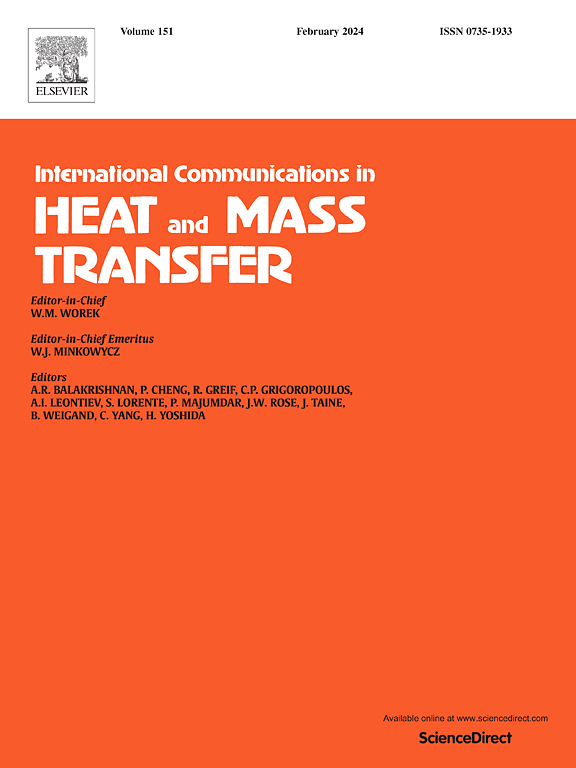Parameterized physics-informed neural networks for a transient thermal problem: A pure physics-driven approach
IF 6.4
2区 工程技术
Q1 MECHANICS
International Communications in Heat and Mass Transfer
Pub Date : 2024-11-18
DOI:10.1016/j.icheatmasstransfer.2024.108330
引用次数: 0
Abstract
Parameterization in computational fluid dynamics is crucial for exploring design ranges and optimizing systems. Traditional methods struggle with efficient parameter variation, requiring multiple simulations and significant computational resources. This study evaluates physics-informed neural networks (PINNs) to address this challenge, highlighting its ability to handle multiple parameter variations, including geometric configurations, Rayleigh, and Prandtl numbers, within different intervals in a single training process. The study focuses on a highly challenging problem in PINNs: transient natural convection, characterized by transient coupled equations with source terms. Although some issues have been previously addressed, applying pure physics-driven PINNs to transient natural convection and parameterization challenges represents a novel approach. The model, benchmarked against finite difference, finite element, and finite volume methods, shows excellent predictive accuracy but surpasses them in versatility and robustness when handling several parameter variations simultaneously. The results show that the computational cost increases by 15 % for parameterizing a single parameter and by 46 % for parameterizing all three parameters simultaneously. Moreover, special normalization techniques for large-scale parameters, such as Rayleigh number, are crucial for parameterized models; without them, the training process may diverge. This paper provides insights and techniques to overcome the challenges in parameterization for coupled problems with source terms.
针对瞬态热问题的参数化物理信息神经网络:纯物理驱动方法
计算流体动力学中的参数化对于探索设计范围和优化系统至关重要。传统方法难以实现有效的参数变化,需要多次模拟和大量计算资源。本研究评估了物理信息神经网络(PINNs)应对这一挑战的能力,强调其在单次训练过程中处理不同区间内多种参数变化的能力,包括几何配置、瑞利和普朗特数。研究重点是 PINNs 中一个极具挑战性的问题:瞬态自然对流,其特点是带有源项的瞬态耦合方程。虽然之前已经解决了一些问题,但将纯物理驱动的 PINNs 应用于瞬态自然对流和参数化挑战是一种新方法。该模型以有限差分法、有限元法和有限体积法为基准,显示出卓越的预测精度,但在同时处理多个参数变化时,其通用性和鲁棒性超过了这些方法。结果表明,对单个参数进行参数化时,计算成本会增加 15%,而同时对所有三个参数进行参数化时,计算成本会增加 46%。此外,大规模参数(如瑞利数)的特殊归一化技术对参数化模型至关重要;如果没有这些技术,训练过程可能会出现偏差。本文提供了克服带源项耦合问题参数化挑战的见解和技术。
本文章由计算机程序翻译,如有差异,请以英文原文为准。
求助全文
约1分钟内获得全文
求助全文
来源期刊
CiteScore
11.00
自引率
10.00%
发文量
648
审稿时长
32 days
期刊介绍:
International Communications in Heat and Mass Transfer serves as a world forum for the rapid dissemination of new ideas, new measurement techniques, preliminary findings of ongoing investigations, discussions, and criticisms in the field of heat and mass transfer. Two types of manuscript will be considered for publication: communications (short reports of new work or discussions of work which has already been published) and summaries (abstracts of reports, theses or manuscripts which are too long for publication in full). Together with its companion publication, International Journal of Heat and Mass Transfer, with which it shares the same Board of Editors, this journal is read by research workers and engineers throughout the world.

 求助内容:
求助内容: 应助结果提醒方式:
应助结果提醒方式:


